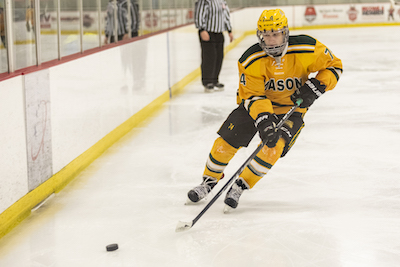Participation in club sports is a significant factor in bringing in and maintaining students at George Mason University, and also contributes to higher graduation rates, a new study has found.

The research, by Mason PhD student Zikun Li, also found that as an engine for recruiting students, club sports could be added to Mason’s broader admissions and marketing strategies.
“These findings enhance the understanding of club sports and its broader impact on the university,” Li said. “Maybe it will inspire other universities to do some comparative studies.”
Li, who is in the interdisciplinary specialization program through the College of Education and Human Development (CEHD), began the study in December 2021 after a request from Paul Bazzano, assistant director of competitive sports, camps, and athletic training at Mason Recreation.
Laurence Chalip, a CEHD professor, a member of Mason’s Recreation Advisory Board, and Li’s advisor, asked his students if anyone was interested. Li was all in, even though the subject was not exactly in her program concentration of sport for development.
In that way, Li embodies Mason’s goal of delivering All Together Different by acting with confidence while trying something unconventional that challenges the status quo.
“As a novice scholar, I appreciate the interconnectedness among disciplines,” said Li, who earned her undergraduate degree in her native China and her master’s at the University of Michigan. “Because of Mason’s interdisciplinary program I have been able to take courses outside the sports area, which gives me a refreshing way to look at it. I’m able to see sports in a broader way.”
“Zikun is deeply interested in the ways in which sport is used effectively and ineffectively for development purposes,” Chalip said. “But clearly, when you work in the policy world, economics matter. Policymakers want to know what the numbers look like. So to develop the kind of skills that will enable her to work in the policy world—understanding how to collect data, and analyzing and thinking through financial data—is really vital. So it made great sense.”

Li surveyed 425 undergraduate club sports athletes during the 2021-22 academic year. The data were eye-opening.
For example ...
- The aggregate spending by undergraduate club sports athletes at Mason in the 2021-22 academic year—including tuition, campus fees, campus housing, food, Mason gear, study-related supplies, parking, and health insurance through the university, minus financial aid—is estimated at more than $21 million.
- Athletes agreed that playing club sports factored into their decision to attend and stay enrolled at Mason, and their decision to recommend the university to potential students. Those participating in men’s ice hockey and men’s football (both of which actively recruit athletes to attend Mason), were especially strong on those scores, with 92.3% of football players and 100% of hockey players saying their participation is a factor in remaining at Mason.
- Students who participate in club sports as freshmen, even if they did not participate as sophomores, graduated at a significantly higher rate than the overall undergraduate student body: 76% to 70.1% for six-year graduates; 66% to 65.7% for five-year graduates; 54% to 47.4% for four-year graduates.
Why is this information important?
There is also a financial consideration, Bazzano said.
“Is there any way we can restructure to support those programs, to lower the barriers of student participants funding them?” he said. “The focus is on how we can reimagine our budget and restructure what we’re doing.”
Andrew Bunting, Mason’s executive director of enrollment services, also found Li’s research useful.
“Her work is certainly research of consequence and can have a direct impact on the way the Mason markets itself to prospective students,” Bunting said. “Zikun’s findings help us to better understand the various and often very personalized factors that motivate students to apply, enroll, and persist at the university.”
Li, who plans to graduate by the end of 2023 and hopes to turn the research into a publishable paper, said the research experience will benefit her eventual search for a faculty position.
“This study not only generated my interest in continuously understanding club sports, but also enhanced my data analysis skills,” Li said. “To do some hands-on analysis really gave me confidence to do more quantitative research in the future.”
